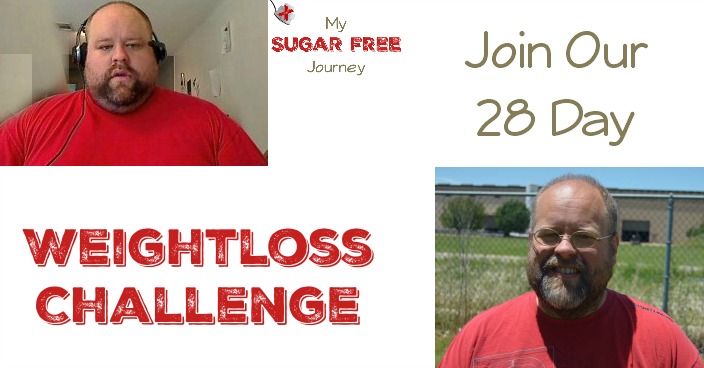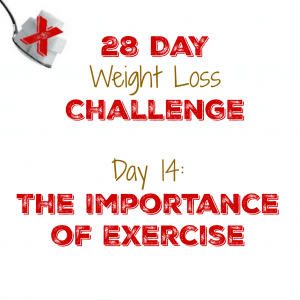Over the course of our 28 Day Weight Loss Challenge our Daily Recap videos will be where I post the notes I have written for the talks I do in the FaceBook Group each night. Hopefully this will make what we are talking about easier to follow for everyone that wants to join us in the challenge. You can see each of the 28 Day Challenge recap posts here. Please subscribe to the YouTube channel to never miss an video.
Now let’s talk about exercise. When I first started on this Sugar Free Journey of mine, it was the information I started reading about exercise that really helped me to see why my previous efforts to lose weight weren’t working. For years I would walk miles, swim dozens of laps in the pool, hit the spin class, lift weights, basically do anything I could think of to lose weight and it never worked. In fact I remember I had a notebook I would write my starting weight down in and after about 3 weeks of writing down 388 lbs over and over again, I realized something was wrong. I didn’t know what was wrong yet, but I knew the exercises I was doing weren’t helping me lose weight.
A pound of fat is 3500 calories so the conventional wisdom has always been that if you keep your food intake constant, you will lose a pound for every 3500 calories you burn in exercise. New studies have shown 2 things. #1 You actually have to burn off almost 4000 calories to lose a pound of fat and #2 it’s almost impossible to hold your food intake constant when exercising. Why? You get hungry when you exercise. You may be able to ignore those hunger pangs for a while but you will eventually give in.
But of course we all know those people that went to boot camp and lost weight, or a sports training camp, or even The Biggest Loser contestants. In almost every case where this happens, a person is in a new and highly regimented environment. For those of us in the same environment we are always in, we don’t have the benefits of those structures (or personal chefs) those new environments afford. Behavior is determined by biochemistry and biochemistry is determined in a big way by environment. Most of us will naturally allow our calorie intake to rise to meet our caloric expenditures when we exercise.
Calories burned by exercise is only a part of your total caloric expenditure, usually between 5 and 35% depending on how active you are. There is also your Resting Energy Expenditure (REE) which the energy you use just by existing. Every cell in your body is a little powerhouse that is constantly using energy and accounts for about 60% of your total energy used. The problem is when you burn more calories with exercise, your body will naturally lower your REE rate to even out your weight. That’s why you can constantly exercise and not lose weight, you are fighting your own biochemistry.
There is also the Thermic Effect of Food.(TEF) This is the energy your body has to use to digest your food and accounts for about 10% of your total energy used. You may not feel hungry in the mornings, I know my father used to always say that he never ate breakfast because he was never hungry before lunch. He was also obese and had a big ole pot belly he was kind enough to pass down to his son. But eating some protein for breakfast will increase your rate of TEF. You will also eat less for lunch and dinner because you started the day off with some protein. Most studies show that people that are able to lose weight and keep it off generally eat breakfast, just stay away from carbs like a muffin or toast. Stick with the eggs and bacon.
Finally, the last way you use energy is through exercise. How exercise helps you lose weight is very misunderstood because generally exercise doesn’t help you lose weight. When you exercise, you are building up your muscle tissue and when you do that, good things happen. You begin to lose inches around your waist, the increased muscle improves your insulin sensitivity, and the bigger muscles increase your REE so you burn fat even when you are not actually exercising. But the losses in fat are matched by the gains in muscle so you won’t see the needle move on your scale. Your total percentage of body fat will change but generally not your weight. This can be frustrating if you are killing yourself with an hour at the gym 3 times a week but at least now you understand what’s happening. Exercise is fantastic but if you want to lose weight, you will need to pair your exercise with a changed way of eating.
Exercise does a few things to make you healthier.
#1 It triggers your sympathetic nervous system to make new mitochondria for your cells. As mitochondria age they become less efficient at their job of making energy and create more harmful waste products. Exercise will clear away the old mitochondria and replace it with new and make your cells more insulin sensitive.
#2 Exercise reduces stress. Your stress hormone is cortisol and when you exercise, cortisol levels go down and endorphins (pleasure hormones) go up. Your stress subsides and is replaced with a generally good feeling. This is the “runner’s high” you may have heard about.
#3 Exercise also increases the rate and efficiency with which your liver and can metabolize your food. More energy available for your mitochondria quicker will give you more energy and the desire to exercise more. We know there are 4 things that will improve your liver’s efficiency (Kreb’s Cycle), cold, altitude, the thyroid hormone, and exercise. The higher the altitude and the colder it is, the more efficient your liver gets. Switzerland and Germany have about the same diet and level of activity but the obesity rate of Switzerland is better than half of the rate of Germany because Switzerland is cold and in the mountains and Germany is flat and temperate. Colorado is the least obese state in the union, it’s also one of the highest above sea level and cold. So you can move to a mountain top to lose weight or just exercise.
What kind of exercise should you do? It doesn’t really matter, just sweat. Just keep in mind that if you have been sedentary for a long time, you need to start slow and do lots of stretching. The rate of injury is much higher when you are just starting a new exercise routine. Be careful but get your exercise in. The most important thing is to be consistent with your exercise. The health benefits of exercise disappear relatively quickly so you need to do a little every day or at least every other day.
All notes taken from information found in Fat Chance by Dr Lustig, Good Calories, Bad Calories by Gary Taubes, The Angriest Trainer Podcast and Jimmy Moore’s Podcasts.
Don’t miss a post! Click here to sign up for our daily email!



